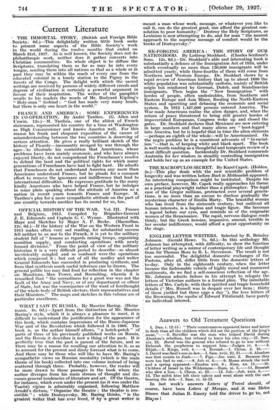WHAT I SAW IN RUSSIA. By Maurice Baring. (Heine mann.
8s. 6d.)—Apart from the distinction of Mr. Maurice Baring's style, which it is always a pleasure to meet, it is difficult to understand the justification for the appearance of this book, which contains impressions of the Russo-Japanese War and of the Revolution which followed it in 1906. The
book is, as the author him:self allows, " a works " of parts of three of his previously published works on Russia, and the Russia it describes is now a thing of the past. It is perfectly true that the past is parent of the future, and so there may be a reason for recalling our attention to it, so as to account for the present and dimly forecast what is to come. And there may be those who will like to have Mr. Baring's sympathetic views on Russian mentality (which is the main theme of his book) collected into one volume instead of being scattered through three. Probably, however, the reader will be more drawn to those passages in the book where the author diverges from his main stream of thought and dis- cusses general tendencies of literature and art. Of the theatre, for instance, which even under the present (as it was under the Tsarist) regime is admirably organized, following Matthew Arnold's dictum, " Organize the theatre ; the theatre is irre- sistible " ; while Dostoyevsky, Mr. Baring thinks, " is the greatest writer that has ever lived, -if by a •great writer ' is
-meant a man whose work, message, or whatever you like to call it, can do the greatest good, can afford the greatest con- solation to poor humanity." Destroy the Holy Scriptures, as Leninism is now attempting to do, and for man ".the. nearest approach to the supreme message of comfort would be the books of Dostoyevsky."


























































 Previous page
Previous page